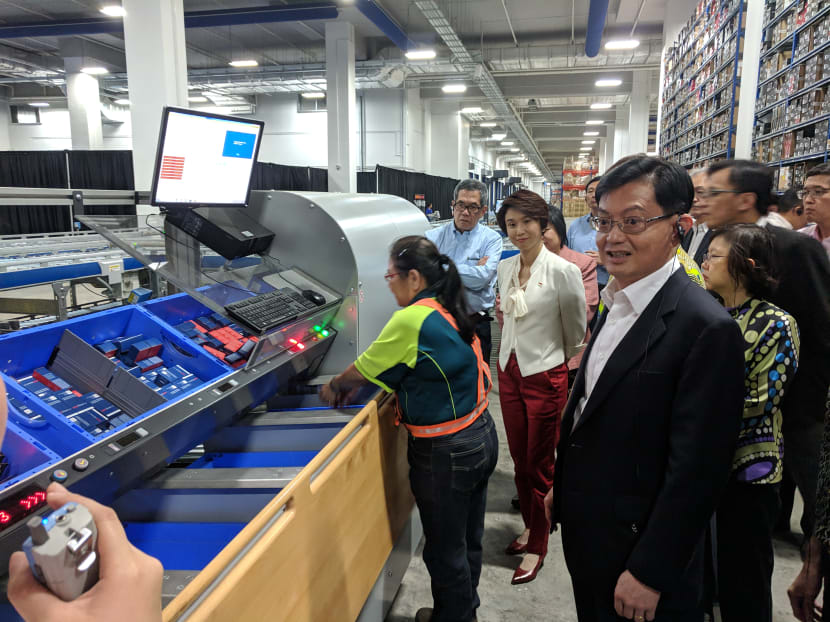More than a quarter of Future Economy Council members are 4G leaders
SINGAPORE — With the inclusion of Ms Indranee Rajah, Mr Ng Chee Meng and Mr Desmond Lee into the Future Economy Council’s (FEC) new term of office, fourth generation (4G) leaders now make up more than a quarter of the council members.

Finance Minister Heng Swee Keat, who chairs the FEC, said that the change in council members is part of a renewal process to bring in “fresh perspectives”. He was speaking on the sidelines of a tour of postal service company SingPost’s regional e-commerce logistics hub in Tampines Logistics Park.
SINGAPORE — With the inclusion of Ms Indranee Rajah, Mr Ng Chee Meng and Mr Desmond Lee into the Future Economy Council’s (FEC) new term of office, fourth generation (4G) leaders now make up more than a quarter of the council members.
A total of 13 new members from the public and private sector, educational institutions and the unions were appointed, with 20 others re-appointed, said the council in a press release on Friday (Nov 16).
Established last year, the FEC aims to drive the growth and transformation of Singapore’s economy for the future. It also oversees the implementation of the recommendations by the Committee on the Future Economy, and has helped launch Industry Transformation Maps (ITMs) for 23 industries.
Among those who stepped down from the council were former Manpower Minister Lim Swee Say, and former Trade and Industry Minister Lim Hng Kiang.
New appointees from the private and other sectors include Dr Azlinda Anwar, who is an assistant director of research and enterprise development at Temasek Life Sciences Laboratory, and president of Nanyang Technological University (NTU).
Finance Minister Heng Swee Keat, who is chairing the FEC, told reporters on Friday that the change in council members is part of a renewal process to bring in “fresh perspectives”. He was speaking on the sidelines of a tour of postal service company SingPost’s regional e-commerce logistics hub in Tampines Logistics Park.
“By gathering the different perspectives from all the different sectors, different industries, different sizes of companies, and from our academic community, we can bring to bear the knowledge of everybody so we can work more closely together in partnership to help our businesses transform, to help our workers learn new skills,” he added.
The FEC will continue to focus on implementing the initiatives laid out in the ITMs, and work with partners to make them more accessible to more businesses and workers, said Mr Heng. It will also continue drive efforts in the upgrading the skills of workers.
Ms Teo Lay Lim, a newly-appointed member and country managing director of consultancy firm Accenture Singapore, said that “the rules of the game” have changed for companies, as competition is no longer confined to their own industry.
She said that her experience in Accenture will give her “line of sight to what’s happening globally”.
Ms Teo added: “We always talk about having a global mind, but a local heart. So, you think and know what’s happening around the world, but you have to respond and do it in a way that’s relevant and valuable to home.”
Mr Heng said SingPost’s e-commerce logistics hub is an example of a company that has utilised technology to transform their business model, retrain their workers to undertake new jobs, and raise productivity significantly.
“Industries are converging. This is a very interesting example of how logistics and retail are converging and how we must meet the new challenges, create as many new opportunities for our workers and for our businesses,” he added.
SingPost’s automated e-commerce logistics hub, which opened in 2016, can process double the number of orders per day as compared with a traditional warehouse — upping the daily orders from 10,000 for a traditional warehouse to about 19,000 for its new hub.
During peak periods such as the most recent Singles Day sales on Nov 11, it processed more than 40,000 orders in a day.
SingPost’s senior operations manager Lin Xueli, 34, said that automation has drastically improved the output of the warehouse, where 400 orders can be processed per hour. Conventional warehouses can only process 400 orders per day.
Only 43 staff operate the automated warehouse, and they process 1,200 items per hour in total, said Ms Lin.
Automation also reduces the physical strain on workers, as they no longer need to walk to find the particular drawer where an item is stocked once an order comes in, she added.
The carousel system automatically detects which boxes contain the item that has been ordered, puts it onto a conveyor belt to a station where staff can place it in an order basket, which will be delivered to an online shopper.
“It’s more beneficial for (elderly workers) as they do not have to travel so much, and they do not have to carry the cargo,” said Ms Lin.








